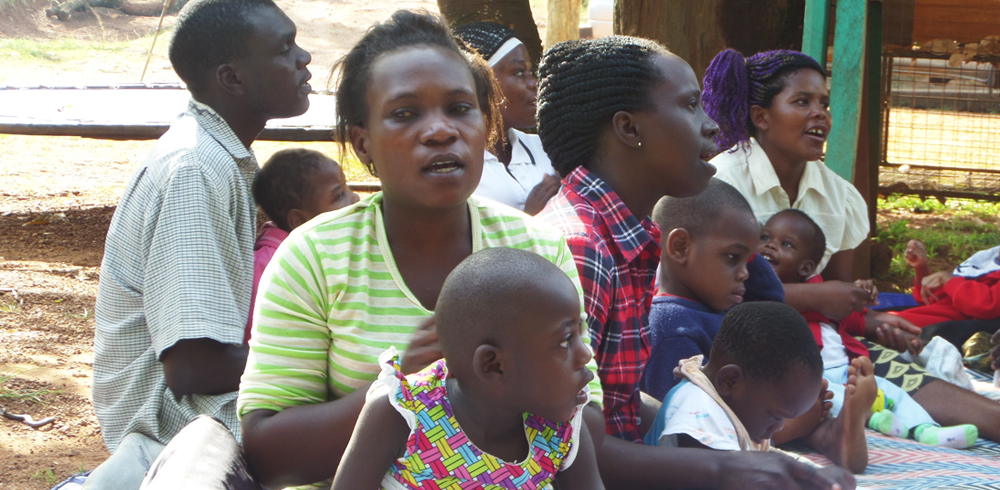
Uganda | Guatemala | Costa Rica | Zimbabwe | Myanmar | Find out more
Across the world, and particularly in areas with less economic development, children with disabilities can be marginalised by societal norms, misunderstanding or physical barriers that make access to schools, churches and other public places more difficult. This can reduce opportunities for development and limit life chances.
Viva’s partner networks are well aware of this and many networks and network members are working to improve understanding and reduce physical barriers for children with disabilities.
The work looks different depending on the city needs and resources available, and what work is already being done in communities. Below is a snapshot of programmes for children with disabilities in some of the countries we work.
According to statistics from UNICEF, only about nine per cent of children with disabilities in Uganda attend primary school.
From its beginning ten years ago, a network member organisation called Mukisa has always been about challenging and changing attitudes to disability, and providing hope through physiotherapy and occupational therapy, support and counselling for parents and home-based care outreach programmes.
With an increasing number of children with learning disabilities coming to Mukisa, the centre started an on-site vocational class in 2011. Then in 2013, it started up one of 20 Creative Learning Centres (CLCs) as part of Viva and CRANE’s catch-up education programme for girls, with Mukisa and one other centre in Kampala dedicated to girls with disabilities.
For many of the girls at Mukisa, gaining vocational skills that will help them earn money in the future is more important than the ability to read and write to a required standard. More than half of the girls at Mukisa regularly achieve their learning targets, and between July and September more than 90 per cent of them did so in vocational skills.
The network in Guatemala responded to crisis that broke out in March 2017 when one of the government children’s homes located in San Jose Pinula set on fire. The home was severely overcrowded, housing 748 minors when it only had capacity for 400. Children experienced violence and abuse driving many to escape. Viva staff felt it was necessary to respond to meet the needs of traumatised and homeless children, some of whom were made disabled by the fire.
UNICEF offered to support government efforts and open five homes for children that survived the fire and requested that Viva be the guarantor of these homes and be responsible for administering the funds. Two houses have been rented out, one housing eight children and the other with 16. Both homes house children with disabilities. 154 children with disabilities were affected. Only two of families came to collect their children, however they later abandoned the children again. Caring for children with disabilities is particularly important as a response to the fire, and often overlooked.
The network in Costa Rica realised that children with disabilities do not have as many opportunities and are often unable to access events put on for children. They carried out situational mapping they invited families with children with disabilities to a fun day. In each area, they identified a host church accessible to children with special needs and worked with small teams of volunteers to prepare them for receiving the families.
For many in the communities this was the first invitation they had ever received to take part in a social event specifically aimed at children with disabilities. The children were invited to vote for their favourite activities by placing a handprint on a prepared chart. The parents were given opportunity to express their hopes and desires which was often an emotional moment as they commented that this was not something they had been asked before.
One family said, “We thank God for the chance to get out from our home and have activities especially for us”. Another said, “It is wonderful to be in a place where people care and treat our children well.”
As a result of this initiative, one church started a support group and other groups are taking part in the World Weekend of Prayer with signing for the deaf, wheelchair access, arts and crafts, a workshop on rights for people with disabilities and a picnic with cake to celebrate birthdays!
The second phase will be to improve the opportunities that the children have to access social activities and be part of their communities. This will involve educating and training those who work with children, changing attitudes and infrastructure. The government has promised 70 per cent of the money towards getting this to happen, leaving the other 30 per cent to be raised locally.
In Zimbabwe we are working to empower young people with disabilities to make informed choices about their health and help them protect themselves from HIV infection, exercise their rights to STI prevention, quality treatment, care and support.
Care givers are trained to work with children with disabilities to become Child Ambassadors and establish clubs which teach about Sexual and Reproductive Health. Trained young people then share what they have learned to ensure that others can benefit from the learning, be vigilant and prevent the spread of disease.
One network member in Myanmar has started a full-time boarding school for children with disabilities who had been in abusive situations in their own homes and communities. This project is caring for 80 children in a poverty-stricken area. The manager says that the network provides support and training.
Programmes like this in Myanmar are mostly family legacy projects currently being managed by the second generation. The manager’s mother started the project for children with disabilities even though she herself is blind.
If you would like to find out more about our work with children with disabilities, we would love to hear from you. Please contact us on (+44) 1865 811 660 or info@viva.org
Other Useful Resources
